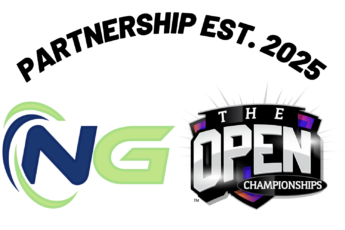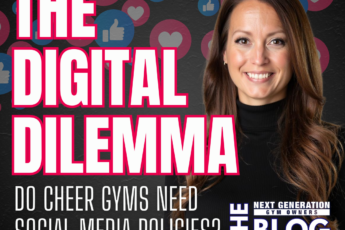A few days ago, I gave you a play-by-play of a less-than-stellar experience I recently had with customer service on our vacation. If you missed that blog, you can catch it here. We talked about how following up after someone expresses a concern is a key to good customer service. So how do you know when you should follow up and when to just let things rest? Here’s what I use to guide me:
When a customer brings you a big concern: I’ll say it’s easier to remember to follow up when someone has brought a concern to you – especially if it’s a big one. If a coach is yelling at kids and being a poor example of a mentor, you’re probably going to solve the issue right away, and parents are going to notice the difference. A follow up, while it’s maybe not as necessary, will always help you gain the respect of your gym families. I have seen gym owners ask this question often actually. They always say, “I want to back my staff!” While I love my staff, I can only back my staff who follow policies and embrace our gym culture. For example, I’ll use Melanie. Those who know Melanie will laugh at me even using this example, which is why I’ll use her. She’s been our gym manager going on almost 10 years. She’s the kindest, sweetest person I know (and she’s single if anyone is reading this who has a desire to live in a small town in Missouri….). If I were to find out though that a parent expressed a concern and Melanie handled it unprofessionally – perhaps dismissing the concern as “not important” or even that she told the parent that – well, I wouldn’t be able to back that staff member. One of the core values in our gym is that “All Things Matter.” We care about the details! That means we need to carefully listen to all concerns and address them with the same respect regardless of how important they initially appear to ME or my staff. If that were to happen, I’d carefully hear out the parent and let them know how something is supposed to be handled. In the event they tell me that’s not the case, then I’d speak to the staff member privately and hear them out. Typically I find that the parent doesn’t like the policy or the staff member didn’t follow a policy or our core values. The follow up is either, “After discussing this, we’ve reviewed this policy and here’s where we’re at…” or “I’ve spoken to this staff member and reviewed the expectations moving forward. On behalf of our company, I want to apologize.” The good thing is, when you teach your staff the values from the beginning, this rarely happens. Every so often there is a mis-interpretation of tone, and I find it challenging to decipher what actually happened, but at the end of the day, I always follow up with parents.
When a customer brings you a small concern: I’ll admit, “big concern” vs. “small concern” is fairly subjective. Nevertheless, this might be something like, “Hey, there isn’t enough seating in the lobby” or “Your WiFi stinks.” Sometimes you can answer those concerns right away. The Wifi one is something we hear often. “I agree! Unfortunately we’re in a 35,000 sq. ft. metal building. Last year we had an IT company come in and evaluate our setup. We ended up buying the best possible routers and putting them in three different locations of the building. At this time, they’ve said this is the best internet we can get in the building. However, the best spot is right by that window!” (Always try to find a helpful suggestion or a “win” even if their comment is a little frustrating. We spent $6,000 on our internet setup last year, so when I hear that comment, I secretly die a little. Do your best to hide that.) At the same time, if it’s something that could reasonably be fixed, write it down! Evaluate it once a month and figure out what you can do to solve the issue. Maybe it’s something like, “You don’t offer anything healthy at the snack bar!” OK. That’s a valid concern. So, consider adding fruit cups, Gogurts and string cheese. But don’t just stop there! Follow up with the parent who complained and thank them for the suggestion! Let them know you will continue to offer them as long as they’re reasonably selling. Again…don’t just start selling the item. They may have started bringing their own snacks and now they never know you resolved an issue, and took their opinions to heart. Let them know!
When a customer brings you an idea: We all know that not all ideas or suggestions will work for you. I’ve received suggestions over the years for things I’ve done and tried in the past (like a sibling room) to things I could never even legally do (like a cocktail bar in the gym). When someone brings you suggestions, one of two things should happen: 1) It makes it in que as a reasonable suggestion that you’re going to do. Maybe it’s a changing table in the men’s restroom. That’s easy! The next day, when you’re working ON your business, order it! Then, send the customer a quick “thank you” email or text letting them know you’ve got one on order! If the suggestion can be done easily, quickly and cheaply, it needs to make your list within the next day or two. All too often it’s not because you didn’t think it was a good idea. Instead, it doesn’t get done because you’re overburdened with the day-to-day operations of the business and you’re too busy answering emails and coaching private lessons to take someone up on their suggestion. (Here is an easy one: “You know, it’s been 13 years since I had a baby. I don’t know if I could even pick out a good changing table. Can you send me a link to one you’d recommend?” Now, you’ve got a parent to HELP you, and you’ve fully bought into their suggestion! Win-Win!) Maybe the idea is great…but you don’t have the resources to do it. I’ve had parents ask for a jogging track around the outside of my gym. Unfortunately with the amount of concrete we’d need, it would cost me tens of thousands to do a project like that – and I’d see little-to-no financial return. Listen to the idea from the parent. Don’t immediately shoot it down even if you know the answer. Look at the root of the issue. In this scenario, it’s that parents want to enjoy a bit of exercise while their child is practicing. They don’t need a track, but maybe instead we can use one of those fancy orange measuring wheels Justin has and find out how many laps around my building is a mile. Post it, and gamify it! (Literally, this would take you 20 minutes. Measure the distance. Make a quick graphic on Canva. Tell parents they can “log their miles” on a clipboard in your gym, and give a prize for the person with the most “Twister Miles” each month! It can literally be an old t-shirt you didn’t sell or a $5 Starbucks gift card. Now, you’ve taken someone’s idea (win!), you’ve made it a social experience for the parents in your gym (win!), you’ve freed up some lobby seating for others (win!) and you’ve given parents something productive to do during practice so they’re not sideline coaching (win! win! win!)
If you’re thinking, “Wow Danielle, I’m not sure I have the time or brain power for stuff like that,” then you may not see the point. “Buy in” builds “loyalty”. You allow parents to “buy in” to something when you take their ideas and follow through with them. Parents who are “bought in” feel important, heard and understood. They will be your biggest advocates when others want to stage a coup. You don’t have to be creative. You just have to know creative people who are in your corner and understand why this sort of stuff matters. You don’t have to spend hours and hours on small stuff, but at the end of the day, “bought in parents” are usually not the ones asking about other gyms anonymously on Crazy Cheer Moms Facebook groups. Retention matters, and you play a big role in it. If this is the sort of stuff you wish you had time for, but you can’t imagine adding one more thing onto your plate, then it’s time to check out the NG Academy. I’ve had gym owners tell me they didn’t have time for the Academy. I get it…another hour every week is hard to fit in. But, if you’re in the weeds now, and again in two weeks, and again in three months and then six months…how will you ever get out. “It will slow down next week” is a vicious lie gym owners tell themselves. The only way to truly slow it down is to learn what working ON your business can do for you. An hour a day can dramatically change your business, but even an hour a week can put a huge dent in the amount of inefficient day-to-day tasks you’re doing.
To learn more about what we do in the Next Gen Academy and how we can help you, click the link below!









